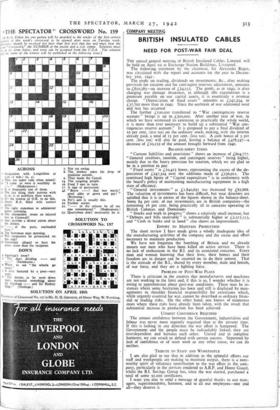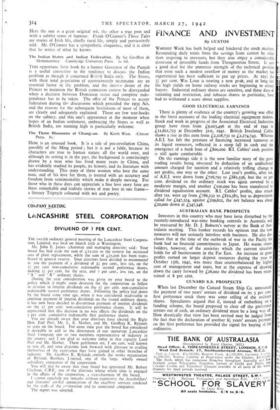COMPANY MEETING
BRITISH INSULATED CABLES
NEED FOR POST-WAR FAIR DEAL THE annual general meeting of British Insulated Cables. Limited, will be held on April 1st at Excnange Station Buildings, Liverpool.
The following statement by the chairman, Sir Alexander Roger, was circulated with the report and accounts for the year to Decem- ber 31st, 1041:
The profit' on trading, dividends on investments, &c., after making provision for taxation and for contingent reserves adjustment, amounts to £810,385—an increase of £24,153. The profit, as in 1940, is after charging war damage insurance, as although this expenditure is a premium payable on our capital assets, it is essentially. a revenue charge. " Depreciation of fixed assets " amounts to £247,324, or £37,702 more than in 1940. Since the outbreak of war additional wear and tear has occurred.
The further £roo,000 transferred to " War contingencies reserve account " brings it up to £300,00o. After another year of war, in which we have witnessed its extension to practically the whole world, it is more than ever necessary to build up a substantial " War con- tingencies reserve account." It is proposed to pay a final dividend of ro per cent. (less tax) on the ordinary stock; making, with the interim already paid, a total of 15 per cent. (less tax). A cash bonus of 5 per cent. (less tax) will also be paid, leaving a balance of £478,547—a decrease of £10,152 of the amount brought forward from 1940.
BALANCE-SHEET ITEMS
" Current liabilities and provisions " shows an increase of £604,777. " General creditors, taxation, and contingent reserves " being higher, mainly due to the heavy provision for taxation, which we are glad to be in a position to pay.
" Fixed assets " is £10,413 lower, representing the excess of the de- predation of £247,324 over the additions made of £236,911. The continued high figure of " Capital expenditure " is in conformity with the board's policy of maintaining manufacturing equipment in a high state of efficiency.
" General investments " at £1,840,631 has increased by £82,868. The valuation of investments has been difficult, but your directors are satisfied that it is in excess of the figures shown in the balance-sheet. Some 84 per cent. of our investments are in British companies—the remaining 16 per cent. being practically all in concerns operating in British Colonies and Dominions
" Stocks and work in progress " shows a relatively small increase, but "Debtors and bills receivable" is substantially higher at £2,313,333, and " Cash in banks and in hand " also shows an improvement,
EFFORT TO MAINTAIN PRODUCTION
The short review I have made gives a wholly inadequate idea of the manufacturing activities of the company and the strain and effort necessary to maintain production.
We have not forgotten the bombing of Britain and we already mourn our men who have been • killed on active service. There is no lack of enthusiasm in the B.I. and its associated concerns. Every man and woman knowing that their lives, their homes and their freedom are in danger can be counted on to do their utmost. That is the attitude of the B.I., shared by every member, male and female, of our force, and they are a fighting force.
PROBLEM OF POST-WAR PLANS
There is criticism in the country that manufacturers and machines are not working to the limit and, if this is so, I wonder whether it is owing to apprehension about post-war conditions. There may be in- stances where some hesitation has been and still is displayed by man- agements to shoulder financial responsibility for extensions which, while urgently essential for war, cannot be described as ordinary finan- cial or trading risks. On the other hand, one knows of numerous cases where these risks have already been taken, with the result that substantial increase in production has been achieved.
UTMOST CONFIDENCE REQUIRED
The utmost confidence between the Government, industrialists and labour was never more urgently required than at the present time. If this is lacking in any direction the war effort is hampered. The Government and the people must be indissolubly linked; they are interdependent and buttress each other. United and in complete harmony, we can attack or defend with certain success. Separated by lack of confidence or of team work or any other cause, we can do neither.
TRIBUTE TO STAFF AND WORKPEOPLE
I am also glad to say that in addition to the splendid efforts our staff and workpeople are making to maintain output, there is a note- worthy spirit of voluntary contribution to the war effort in the com- pany, particularly in the services rendered to A.R.P. and Home Guard, whilst the B.I. Savings Group has, since the war started, purchased a total of some 91,000 certificates.
I want you also to send a message of grateful thanks to our man- agers, superintendents, foremen, and to all our employees—one and all—they deserve it
Here the one is a great original wit, the other a true poet and with a subtler sense of humour. Frank O'Connor's Three Tales are stories of Irish life, chiefly rural life, simply and persuasively told. Mr. O'Connor has a sympathetic eloquence, and it is dear that he writes of what he knows.
The Indian States and Indian Federation. By Sir Geoffrey de
Montmorency. Cambridge University Press. 6d.
THIS opportune little book by a former Governor of the Punjab is a useful corrective to the tendency to discuss the Indian problem as though it concerned British India only. The States, with their total population of approximately 90,000,000 are an essential factor in the problem, and the intense desire of the Princes to maintain the British connexion cannot be disregarded when a decision between Dominion status and complete inde- pendence has to be taken. The offer of the Princes to accept federation during the discussions which preceded the 1935 Act, and. the reasons for the subsequent hesitations of most of them, are clearly and adequately explained. There are few text-books on the subject, and this one's appearance at the moment when hopes of an Indian settlement, embracing the States as well as British India, are running high is particularly welcome.
The Three Blossoms of Chang-an. By Keith West. (Cresset Press. 8s.'
HERE is an unusual book. It is a tale of pre-revolution China, possibly of the Ming period ; but it is not a fable, because its characters are true to human nature all the world over, and although its setting is in the past, the background is convincingly drawn by a man who has lived many years in China, and has evidently studied its people, its history, and its literature with understanding. This story of three women who love the same man, and of his love for them, is treated with an accuracy and freedom from sentimentality which make it deeply moving. For those who in these days can appreciate a fine love story here are three remarkable and realistic stories of true love in one frame— a literary Triptych coloured with wit and poetry.



























 Previous page
Previous page